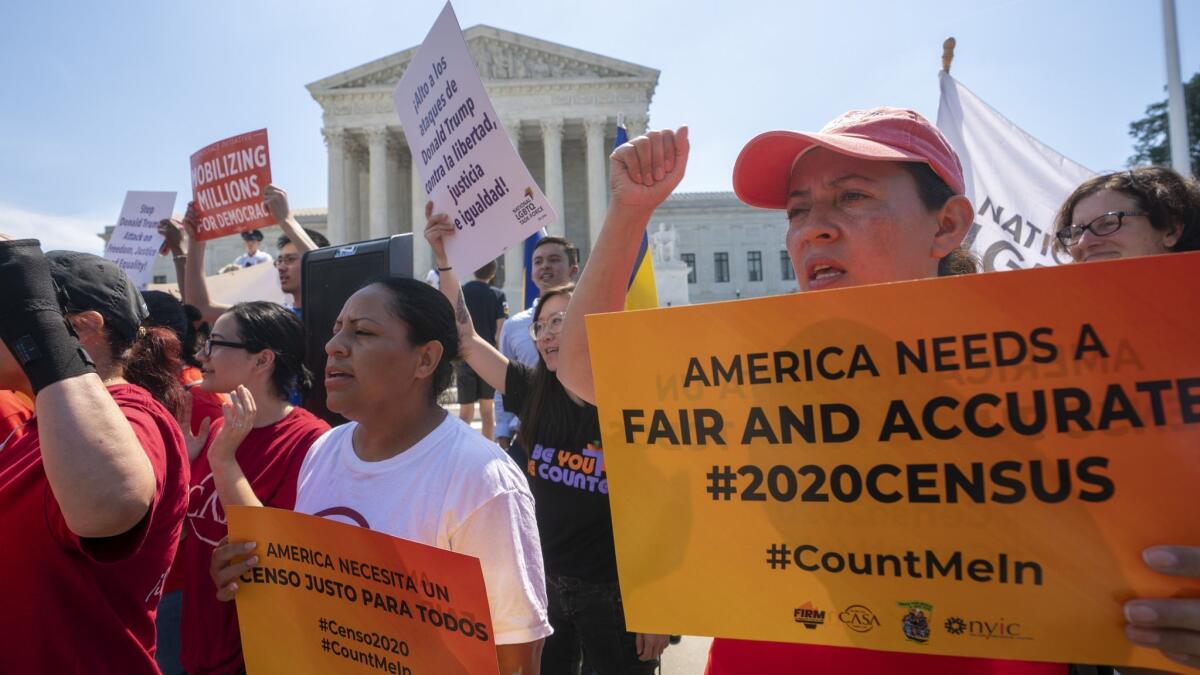Trump administration abruptly gives up fight over citizenship question on the census

- Share via
Reporting from Washington — The Trump administration, abruptly switching course, decided Tuesday to give up its fight to add a question about citizenship to next year’s census.
The decision was an unusual retreat by the administration on a high-visibility, highly partisan issue and a major victory for civil rights groups and states, including California, that had challenged the move in court.
Administration officials had tried for more than a year to get the question added to the census, taking their argument to the Supreme Court. President Trump, as recently as Monday, had repeated his insistence that doing so was necessary.
Although the administration lost 5 to 4 in the Supreme Court last week, the decision by Chief Justice John G. Roberts Jr. had given Trump officials an opening to try again if they could come up with a more convincing rationale, and conservative lawyers and advocacy groups had lobbied hard for the Justice Department to do so.
Democrats had argued that adding a question on citizenship would have been a partisan ploy to reduce minority participation in the census.
Officials in California and other states, as well as neutral experts, warned the question would discourage many people from responding to the census and therefore result in an undercount of immigrants.
That could cost some states billions in federal funds and increase the number of congressional seats in states with relatively low immigrant populations at the expense of California and other states with large numbers of immigrants.
The census has not included a question about citizenship since 1950, in part because of concerns about causing an undercount.
Word of the decision to give up the fight came initially in an email from a Justice Department attorney to lawyers who had challenged the administration in court. The email announced the decision to begin printing census forms without the controversial question.
A Justice Department spokesperson subsequently confirmed the decision. Administration officials, however, did not provide an explanation for their change of course.
In a terse statement, Commerce Secretary Wilbur Ross, whose agency oversees the Census Bureau, said he still disagreed with the Supreme Court’s decision. But, he added, “the Census Bureau has started the process of printing the decennial questionnaires without the question. My focus, and that of the Bureau and the entire Department is to conduct a complete and accurate census.”
Late Tuesday, Trump, in a Twitter message, said the Supreme Court decision marked a “sad time for America” and added that he had “asked the Department of Commerce and the Department of Justice to do whatever is necessary to bring this most vital of questions, and this very important case, to a successful conclusion.”
It was unclear whether he was referring to a specific plan or simply expressing displeasure.
After the Supreme Court’s decision, in which Roberts said that Ross had not provided an honest answer for why he wanted to add the citizenship question, Trump had publicly called for delaying the census.
On Monday, he had repeated his belief that the question was critical.
“I think it’s very important to find out if somebody is a citizen as opposed to an illegal,” he said at the White House. “I think there’s a big difference, to me, between being a citizen of the United States and being an illegal.”
Because the census by law must keep responses anonymous, putting a citizenship question on the survey would not actually let officials know who is a legal resident and who isn’t. But it could have had a major impact on the distribution of billions of dollars in federal funds and the balance of political power in the country.
The Constitution requires that the census be held every 10 years and that the number of House seats be allocated among the states based on their total population. Some conservatives have advocated moving to an allocation based on the citizen population only. Asking about citizenship on the census could have been a first step in that direction.
Many conservative activists and legal scholars reacted harshly to Roberts’ siding with the Supreme Court’s liberals to reject the administration’s plans. Some accused him of betrayal.
But while outside conservative groups advocated pushing ahead with the fight to add the question to the census, the court’s decision left administration lawyers with few paths forward.
In their briefs to the court, the administration’s lawyers had said the deadline to begin printing census forms was July 1. And they said the only reason for adding the citizenship question was to improve enforcement of the Voting Rights Act.
Roberts refused to accept that rationale, calling it “contrived” and contrary to the evidence.
So while the administration was theoretically free to try again, lawyers would have been forced to tell the courts that their previous statements about both the deadline and the justification were wrong.
The administration’s legal case was further complicated by evidence that surfaced while the case was pending at the Supreme Court that suggested Ross may have been influenced by a now-deceased Republican strategist, Thomas Hofeller. He advocated for a citizenship question as a crucial step toward preserving Republican political power.
Outside legal analysts had said the administration’s odds of prevailing were very low.
“In light of the Supreme Court’s ruling, the Trump administration had no choice but to proceed with printing the 2020 census forms without a citizenship question,” said Dale Ho, director of the ACLU’s Voting Rights Project, who argued the Supreme Court case on behalf of the administration’s opponents.
“Everyone in America counts in the census, and today’s decision means we all will,” Ho said in a statement.
Times staff writer Del Quentin Wilber in Washington contributed to this report.
More to Read
Get the L.A. Times Politics newsletter
Deeply reported insights into legislation, politics and policy from Sacramento, Washington and beyond. In your inbox twice per week.
You may occasionally receive promotional content from the Los Angeles Times.












